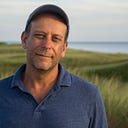Member-only story
The Creature That Might Save Us
Small, dynamic, diverse. Perhaps even magical.
Every few years I find myself in a room packed tight with human-size tubes of algae. The colors range from burnt sienna to electric Kool Aid-green. Quietly and humbly they do their work, converting sunlight to sugars and proteins, befuddling researchers with their multitudes, inviting we “advanced” humans to poke around and try figure out exactly what else we might do with these fantastical creatures. To date, we have only really nibbled around the edges of the possibilities.
For there’s quite a lot they already do, even if we know so very little. They make available to us half of the world’s breathable oxygen, and an equally impressive amount of the world’s carbon at one time or another passes through their membranes. One species of micro algae a creature, called Prochlorococcus, is the most abundant living thing on earth. It contains four times as many genes as human DNA — genes that could address numerous ecological problems if humans could only figure out a way to properly manipulate them. Prochlorococcus is one of the primary ways solar energy enters the ocean food web and gets transferred to higher life. Thirty years ago, we didn’t even know Prochlorococcus existed.
“One acre produces almost ten thousand tons of protein per…
